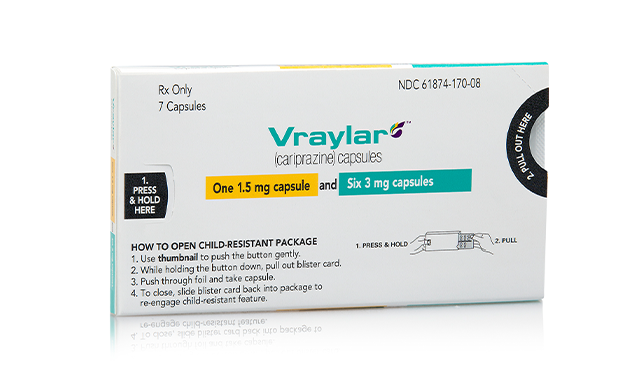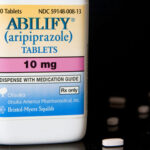Cariprazine (Vraylar): Uses, Benefits, How it works, Side Effects

What Is Cariprazine (Vraylar) And What Does It Treat?
Cariprazine (Vraylar) is a novel antipsychotic drug used to treat schizophrenia (a mental illness that causes disturbed or unusual thinking, loss of interest in life, and strong or inappropriate emotions). Cariprazine (Vraylar) is also used to treat episodes of depression in people with bipolar I disorder (manic depressive disorder; a disease that causes episodes of mania, episodes of depression, and other abnormal moods). It is also used as a short-term treatment for episodes of mania or mixed episodes (symptoms of mania and depression that happen together) in people with bipolar I disorder.
Cariprazine (Vraylar) may also be helpful when prescribed “off-label” for other mental health conditions. “Off-label” means that it has not been approved by the Food and Drug Administration for this condition. Your mental health provider should justify his or her thinking in recommending an “off-label” treatment. They should be clear about the limits of the research around that medication and if there are any other options.
How does Cariprazine (Vraylar) work?
Cariprazine (Vraylar) is in a class of medications called atypical antipsychotics. It works by changing the activity of certain natural substances in the brain to treat schizophrenia. It is also known as a second-generation antipsychotic (SGA). Cariprazine (Vraylar) rebalances dopamine and serotonin to improve thinking, mood, and behavior.
Cariprazine attaches to receptors (targets) in the brain for two neurotransmitters called dopamine and serotonin, which nerve cells use to communicate with neighboring cells. Since dopamine and serotonin play a role in schizophrenia, by attaching to their receptors, cariprazine helps normalize the activity of the brain. This reduces symptoms of schizophrenia and prevents them from returning.
What benefits of Cariprazine (Vraylar) have been shown in studies?
Studies showed that Cariprazine (Vraylar) improves symptoms of schizophrenia and prevents symptoms from returning.
In three main studies in a total of 1,795 adults, Cariprazine (Vraylar) was more effective than placebo (a dummy treatment) at reducing symptoms on a standard rating scale called PANSS (positive and negative syndrome scale). The PANSS score, which ranges from a minimum of 30 (no symptoms) to a maximum of 210 (severest symptoms), was around 96 at the start of treatment. After 6 weeks, depending on the study, the PANSS score fell by 17 to 23 points with Cariprazine (Vraylar) compared with 9 to 14 points with placebo.
A fourth main study in 461 patients who mostly had ‘negative’ symptoms (such as lack of drive, social withdrawal, and problems with attention and memory) and only a few ‘positive’ symptoms (such as delusions and hallucinations) showed that Cariprazine (Vraylar) was effective at treating negative symptoms: after 26 weeks of treatment Cariprazine (Vraylar) lowered the PANSS score for negative symptoms by around 9 points compared with around 7 points with another medicine, risperidone.
Finally, a fifth main study in 200 patients showed that Cariprazine (Vraylar) was more effective than placebo at preventing symptoms from coming back after initial treatment. Over a 72 week period, symptoms returned in a quarter of patients taking Cariprazine (Vraylar) compared with around half of those taking placebo.
What Is The Most Important Information I Should Know About Cariprazine (Vraylar)?
Schizophrenia requires long-term treatment. Do not stop taking cariprazine even when you feel better.
With input from you, your health care provider will assess how long you will need to take the medicine.
Missing doses of cariprazine may increase your risk for a relapse in your symptoms.
Do not stop taking cariprazine or change your dose without talking to your healthcare provider first.
For cariprazine to work properly, it should be taken every day as ordered by your healthcare provider.
What Should I Discuss With My Healthcare Provider Before Taking Cariprazine (Vraylar)?
• Symptoms of your condition that bother you the most
• If you have thoughts of suicide or harming yourself
• Medications you have taken in the past for your condition, whether they were effective or caused any adverse effects
• If you ever had muscle stiffness, shaking, tardive dyskinesia, neuroleptic malignant syndrome, or weight gain caused by a medication
• If you experience side effects from your medications, discuss them with your provider. Some side effects may pass with time, but others may require changes in the medication.
• Any psychiatric or medical problems you have, such as heart rhythm problems, long QT syndrome, heart attacks, diabetes, high cholesterol, or seizures
• If you have a family history of diabetes or heart disease
• All other medications you are currently taking (including over the counter products, herbal and nutritional supplements) and any medication allergies you have
• Other non-medication treatments you are receiving, such as talk therapy or substance abuse treatment. Your provider can explain how these treatments work with the medication.
• If you are pregnant, plan to become pregnant, or are breast-feeding
• If you smoke, drink alcohol, or use illegal drugs
How Should I Take Cariprazine (Vraylar)?
Cariprazine (Vraylar) is usually taken once daily with or without food. Typically, patients begin at a low dose of medicine and the dose is increased slowly over several weeks.
The dose usually ranges from 1.5mg to 6mg. Only your healthcare provider can determine the correct dose for you.
Use a calendar, pillbox, alarm clock, or cell phone alert to help you remember to take your medication. You may also ask a family member or a friend to remind you or check in with you to be sure you are taking your medication.
What Happens If I Miss A Dose Of Cariprazine (Vraylar)?
If you miss a dose of cariprazine, take it as soon as you remember, unless it is closer to the time of your next dose. Discuss this with your healthcare provider. Do not double your next dose or take more than what is prescribed.
What Should I Avoid While Taking Cariprazine (Vraylar)?
Avoid drinking alcohol or using illegal drugs while you are taking cariprazine. They may decrease the benefits (e.g., worsen your confusion) and increase adverse effects (e.g., sedation) of the medication.
What Happens If I Overdose With Cariprazine (Vraylar)?
If an overdose occurs, call your doctor or 911. You may need urgent medical care. You may also contact the poison control center at 1-800-222-1222. A specific treatment to reverse the effects of cariprazine does not exist.
Can a pregnant woman take Cariprazine (Vraylar)?
If you are planning on becoming pregnant, notify your healthcare provider to best manage your medications. People living with schizophrenia who wish to become pregnant face important decisions. This is a complex decision since untreated schizophrenia has risks to the fetus, as well as the mother. It is important to discuss the risks and benefits of treatment with your doctor and caregivers.
Antipsychotic use during the third trimester of pregnancy has a risk for abnormal muscle movements (extrapyramidal symptoms [EPS]) and/or withdrawal symptoms in newborns following delivery. Symptoms in the newborn may include agitation, feeding disorder, hypertonia, hypotonia, respiratory distress, somnolence, and tremor; these effects may be self-limiting or require hospitalization.
Can a breastfeeding woman take Cariprazine (Vraylar)?
Caution is advised with breastfeeding. It is unknown whether cariprazine is present in breast milk. At the moment no information is available on the use of cariprazine during breastfeeding. Until more data become available, an alternate drug may be preferred, especially while nursing a newborn or preterm infant.
What Are The Possible Side Effects Of Cariprazine (Vraylar)?
Cariprazine (Vraylar) may cause side effects. Tell your doctor if any of these symptoms are severe or do not go away:
• agitation
• anxiety
• blurred vision
• constipation
• difficulty falling asleep or staying asleep
• dizziness, feeling unsteady, or having trouble keeping your balance
• extreme tiredness
• increased appetite
• increased saliva or drooling
• indigestion
• nausea
• restlessness
• weight gain
Some side effects can be serious. If you experience any of these, call your doctor immediately or get emergency medical treatment:
• blank facial expression
• dark or cola-colored urine
• decreased urination
• difficulty swallowing or breathing
• falling
• fever, sweating, confusion, fast breathing, fast or irregular heartbeat, and severe muscle stiffness
• hives
• itching
• loss of ability to move
• muscle weakness or aching
• rash
• seizures
• slow movements or shuffling walk
• swelling in legs and feet
• swelling of the face, throat, tongue, lips, or eyes
• tightness in the throat
• tongue that sticks out of the mouth
• unusual movements of your body or face that you cannot control
Cariprazine (Vraylar) may cause other side effects. Call your doctor if you have any unusual problems while taking this medication.
Is Cariprazine (Vraylar) a safe medication?
This medication is safe when used as prescribed. However, Cariprazine (Vraylar) may increase the blood levels of a hormone called prolactin. Side effects of increased prolactin levels include females losing their period, production of breast milk, and males losing their sex drive or possibly experiencing erectile problems. Long-term (months or years) of elevated prolactin can lead to osteoporosis or increased risk of bone fractures.
Some people may develop muscle-related side effects while taking cariprazine. The technical terms for these are “extrapyramidal symptoms” (EPS) and “tardive dyskinesia” (TD). Symptoms of EPS include restlessness, tremor, and stiffness. TD symptoms include slow or jerky movements that one cannot control, often starting in the mouth with tongue rolling or chewing movements.
Temperature regulation: Impaired core body temperature regulation may occur; caution with strenuous exercise, heat exposure, and dehydration.
Second-generation antipsychotics (SGAs) increase the risk of weight gain, high blood sugar, and high cholesterol. This is also known as metabolic syndrome. Your healthcare provider may ask you for a blood sample to check your cholesterol, blood sugar, and hemoglobin A1c (a measure of blood sugar over time) while you take this medication.
SGAs have been linked with a higher risk of death, strokes, and transient ischemic attacks (TIAs) in elderly people with behavior problems due to dementia.
All antipsychotics have been associated with the risk of sudden cardiac death due to an arrhythmia (irregular heartbeat). To minimize this risk, antipsychotic medications should be used in the smallest effective dose when the benefits outweigh the risks. Your doctor may order an EKG to monitor for an irregular heartbeat.
Neuroleptic malignant syndrome is a rare, life-threatening adverse effect of antipsychotics that occurs in <1% of patients. Symptoms include confusion, fever, extreme muscle stiffness, and sweating. If any of these symptoms occur, contact your healthcare provider immediately.
All antipsychotics can cause sedation, dizziness, or orthostatic hypotension (a drop in blood pressure when standing up from sitting or lying down). These side effects may lead to falls which could cause bone fractures or other injuries. This risk is higher for people with conditions or other medications that could worsen these effects. If falls or any of these symptoms occur, contact your healthcare provider.
Are There Any Risks For Taking Cariprazine (Vraylar) For Long Periods Of Time?
Tardive dyskinesia (TD) is a side effect that develops with prolonged use of antipsychotics. Medications such as cariprazine have been shown to have a lower risk of TD compared to older antipsychotics, such as Haldol® (haloperidol). If you develop symptoms of TD, such as grimacing, sucking, smacking of lips, or other movements that you cannot control, contact your healthcare provider immediately. All patients taking either first or second-generation antipsychotics should have an Abnormal Involuntary Movement Scale (AIMS) completed regularly by their healthcare provider to monitor for TD.
Second-generation antipsychotics (SGAs) increase the risk of diabetes, weight gain, high cholesterol, and high triglycerides. (See “Serious Side Effects” section for monitoring recommendations).
What Other Medications May Interact With Cariprazine (Vraylar)?
The following medications may increase the levels and effects of cariprazine:
- itraconazole
- ketoconazole
The following medications may decrease the levels and effects of cariprazine:
- rifampin
- carbamazepine.





